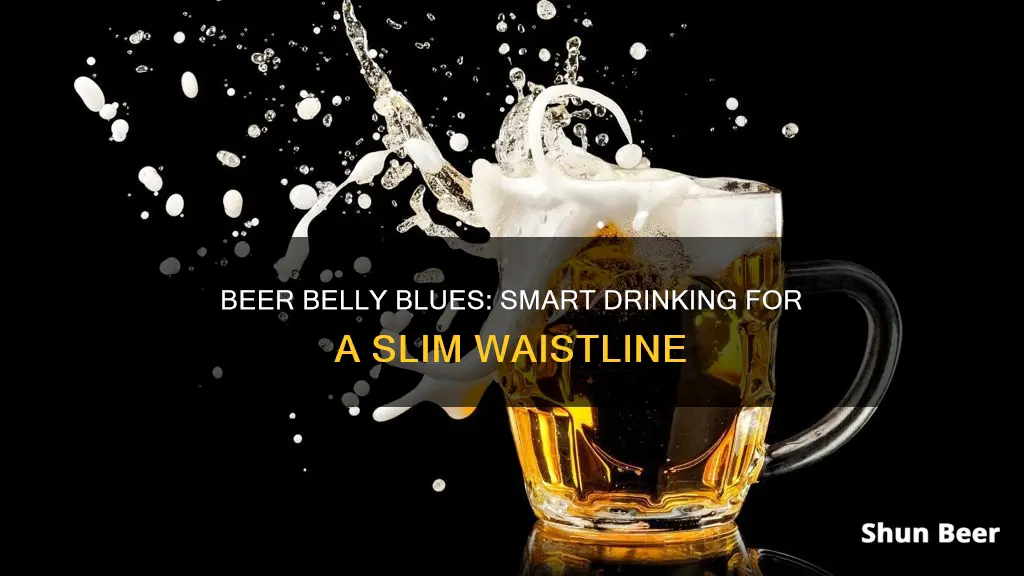
Beer bellies are a common phenomenon, especially among men, but are they caused by beer? While beer is not solely responsible for abdominal obesity, it does contribute to it by adding extra calories. A standard 12-ounce beer contains about 150 calories, and these calories can quickly add up if you're drinking several in one sitting. Additionally, alcohol interferes with fat burning as the liver prioritizes burning alcohol over burning fat. This means that drinking beer can lead to an increase in overall body fat, including belly fat. However, it is important to note that other factors such as diet, age, and hormonal changes also play a role in the development of a beer belly. To avoid a beer belly, it is recommended to drink in moderation, opt for lighter beers, and combine a balanced diet with regular physical activity.
| Characteristics | Values |
|---|---|
| Calories | Beer contains as many calories as a soft drink, with an average can of beer containing more than 150 calories. |
| Appetite | Alcohol stimulates your appetite, which can lead to eating more. |
| Impaired judgment | Alcohol impairs judgment, which can lead to less healthy food choices. |
| Fat-burning interference | Alcohol gets in the way of your body's ability to burn fat as the liver prioritises burning alcohol over fat. |
| Phytoestrogen content | Beer contains phytoestrogens, plant compounds that can mimic the female sex hormone estrogen, which may increase the risk of storing belly fat. |
| Binge drinking | Binge drinking is linked to an increased risk of belly fat. |
| Gender | Men are more likely to develop a beer belly due to drinking more heavily, storing fat around the belly, and the effect of alcohol on testosterone levels. |
| Age | Beer bellies are more prominent in older people due to decreased activity levels, lower calorie needs, and changing hormone levels. |
What You'll Learn

Drink in moderation
Drinking beer in moderation is possible, and it may not lead to an increase in body weight or belly fat. However, drinking beer can cause weight gain, including belly fat, especially when consumed in excess. Here are some tips to help you drink beer in moderation:
Understand the Guidelines for Moderate Drinking
According to the US Department of Health and Human Services, moderate drinking for women is defined as no more than one drink per day, and for men, it is no more than two drinks per day. One drink is typically defined as 12 ounces of beer. It's important to note that these guidelines are for healthy adults, and individual factors such as medical conditions, medications, and family history can also impact the definition of moderate drinking.
Keep Track of Your Drinking
Start by understanding your current drinking habits. Keep a drink diary or use apps to track your drinks and blood alcohol concentration (BAC). This will help you gain a realistic view of your consumption patterns. Set realistic goals for your alcohol consumption and stick to them.
Pace Yourself and Space Your Drinks
Drink slowly, limiting yourself to one drink per hour. Alternate alcoholic drinks with non-alcoholic beverages, such as water or club soda. This will help you stay hydrated and pace your drinking. Avoid drinking games or situations that encourage rapid or excessive consumption.
Avoid Heavy Drinking Situations and Triggers
Identify the people, places, and circumstances that trigger heavy drinking for you, and try to avoid them. If you find yourself in such situations, have a non-alcoholic drink in your hand to avoid unwanted attention. Learn to say "no" politely when offered drinks that exceed your limits.
Don't Drink on an Empty Stomach
Always eat something before or while you're drinking. Drinking on an empty stomach can lead to faster absorption of alcohol and increase the likelihood of overconsumption. Eating slows down the absorption of alcohol and can help you stay within your limits.
Choose Lower-Calorie Options
Opt for lower-calorie beers or non-alcoholic beers and mocktails. Beers with higher alcohol content tend to have more calories, which can contribute to weight gain. Additionally, alcohol stimulates your appetite, so be mindful of your food choices while drinking.
Remember, drinking in moderation is about being mindful and conscious of your consumption. It's about enjoying alcohol while minimizing potential negative consequences. If you find it challenging to drink in moderation or feel concerned about your drinking habits, consider seeking advice from a healthcare professional.
Golfers' Beer Consumption: How Much is Too Much?
You may want to see also

Choose light beers
If you're concerned about developing a beer belly, opting for light beers is a sensible choice. Light beers typically have fewer calories than their regular counterparts, which can help you avoid excess calorie consumption—a key contributor to weight gain and belly fat.
Beer is known to be high in calories, with a typical beer containing around 150 calories. These calories can add up quickly, especially if you're consuming several beers in one sitting. Light beers, on the other hand, can have 100 calories or less, significantly reducing your calorie intake.
When choosing light beers, pay attention to the alcohol content as well. Beers with a higher alcohol content tend to have more calories. So, if you're looking to cut down on calories, opt for light beers with a lower alcohol percentage.
Additionally, consider the serving size. Even with light beer, drinking large quantities can still contribute to excess calorie intake. Moderation is key. Aim for portions of less than 17 ounces (500 ml) per day, as studies suggest that drinking within this limit does not seem to lead to an increase in body weight or belly fat.
It's worth noting that while light beers can help reduce your calorie intake, they may not completely eliminate the risk of developing a beer belly. Other factors, such as your overall diet, exercise habits, age, sex, and hormones, also play a role in weight gain and fat distribution.
In conclusion, choosing light beers is a sensible strategy to reduce your calorie intake and lower the risk of developing a beer belly. However, it should be coupled with a healthy diet, regular exercise, and moderation in your drinking habits for the best results.
Beer and Shraddha: A Spiritual Conundrum for Devotees
You may want to see also

Avoid unhealthy foods
To avoid unhealthy foods, it's important to be mindful of what you're consuming and understand how it affects your overall mental and physical well-being. Here are some tips to help you make healthier choices:
- Limit processed and refined foods: These include foods made with refined wheat flour or maida, which are low in dietary fiber, vitamins, minerals, and other essential nutrients. Refined and processed foods can lead to constipation and, in severe cases, colon cancer. Opt for whole-grain foods like whole-grain bread, quinoa, or chickpea flour, which provide more fiber and nutrients.
- Reduce sugar intake: Sugar is often referred to as empty calories since it provides energy but no other nutrients. Excess sugar consumption is linked to tooth decay, diabetes, heart disease, and cancer. Cut back on sweets, candies, chocolates, soft drinks, fruit juices, and biscuits, and consume sugar in moderation by getting it from natural sources like fruits, vegetables, dry fruit, and milk products.
- Caffeine consumption: Coffee, chocolates, and colas are significant sources of caffeine, which can cause headaches, depression, insomnia, high blood pressure, and fatigue. Excess caffeine can also disrupt your sleep and increase the risk of heart disease. If you want to cut back on caffeine, opt for herbal teas, lemon water, or plain water instead.
- Limit alcohol consumption: Alcoholic beverages like beer contribute to weight gain and are linked to various health issues. Excess alcohol consumption is associated with an increased risk of inflammation, liver disease, and cancer. If you want to reduce your alcohol intake, try non-alcoholic options like non-alcoholic beer or mocktails.
- Choose healthier fats: Avoid excessive consumption of saturated and trans fats, which can lead to obesity, increased cholesterol levels, and heart-related problems. Opt for healthier fats like olive oil, nuts, and seeds, which provide essential fatty acids and have cardiovascular benefits.
- Read food labels: When purchasing packaged or processed foods, read the nutrition labels to make informed choices. Look for options with less added sugar, sodium, and artificial additives. Understanding what's in your food will help you make healthier selections.
- Moderation and balance: Remember, moderation is key. You don't have to eliminate all unhealthy foods from your diet completely. Enjoy your favorite treats in moderation and strive for a balanced diet that includes a variety of whole, unprocessed foods.
Is Root Beer Safe for 13-Year-Olds to Drink?
You may want to see also

Exercise regularly
While there is no magic formula to getting rid of a beer belly, regular physical activity and a balanced diet can help. Here are some exercises you can do to reduce that beer belly:
Donkey kickbacks
Start on all fours, with your hands directly under your shoulders and your knees directly under your hips. Keep your right knee at a 90-degree angle as you slowly raise your leg behind you until your thigh is almost parallel to the floor. Push your flexed foot toward the ceiling by squeezing your glutes. Your back should remain perfectly still in a neutral spine. The motion should be small and controlled with the muscle doing the work and not momentum. Return to the start position to complete one rep. Repeat on the other side. Do 3 sets of 25 repetitions on each side.
Mountain climber
Mountain climber exercises are among the few ab workouts that provide a complete abdominal and cardio training session. They require you to engage your upper arm muscles, as well as your core and your legs. Begin in a push-up position, then bring your knees toward your chest. Keep your lower back straight during the motion, and bring your knees forward as much as you can stretch. Do 3 sets of 25 repetitions on each side.
Push-up
A push-up not only helps you get a stronger upper body but also a stronger midsection. It incorporates the stabilisation muscles of your core, combining an upper-body pushing movement with a plank. It is one of the best and most basic exercises for your midsection. Do sets of 3 with as many push-ups as you can manage in 1 ½ minutes.
Plank
Planks burn more calories than sit-ups or crunches because they engage more muscles in the legs, arms, and rear. It is considered the most effective core exercise. It can help reduce back pain and improve posture. Do a set of 3. Hold the plank for at least 1 minute.
Bicycle crunch
Lie flat on your back with your hands behind your head. Lift your knees off the floor towards your chest. First, rotate to the right and try to meet your left knee with your right elbow while you extend the right leg straight out, and then vice versa. Do a set of 3 with 20 repetitions on each side.
Jump rope
Jumping rope is relatively easy to do and affordable. It burns calories and can get you into shape quickly. According to a study published in Research Quarterly, jumping rope for 10 minutes can offer similar cardiovascular benefits to jogging for 30 minutes.
Squats
Squats are often called the "king of exercises" because they are an amazing full-body workout. They work your core muscles and improve your posture, which can help reduce the appearance of a beer belly.
Kettlebell swings
Kettlebell swings are effective at sculpting muscles, improving core strength, building strength, and increasing endurance. They are a great addition to your fitness regimen if you want to get rid of the beer belly fast.
Sprints
Adding sprints to your fitness regimen is a super-effective way to burn calories and take your fitness to the next level. Sprint intervals are considered a high-intensity interval training (HIIT) exercise, which research shows is key to getting rid of belly fat.
Beer and Prozac: Safe Mix or Risky Business?
You may want to see also

Reduce stress
While there is no direct evidence that drinking beer contributes to weight gain around the abdomen, beer and other types of alcohol play a role in weight gain in general. Beer can increase your calorie intake, prevent your body from burning fat efficiently, and alter your hormone levels.
Exercise
Regular exercise is an effective way to reduce stress and improve overall health. Aim for at least 30 minutes of moderate-intensity aerobic exercise, such as walking or cycling, most days of the week. Additionally, include strength training and stretching in your routine, and try high-intensity interval training (HIIT) for greater benefits.
Healthy Diet
A healthy diet is crucial for managing stress and weight. Eat more fruits, vegetables, whole grains, and lean proteins, while reducing processed foods, sugary drinks, and refined grain products. Making healthy food swaps, like choosing strawberries instead of ice cream, can make a big difference.
Lifestyle Changes
Make lifestyle choices that will help you burn more calories naturally, such as taking the stairs instead of the elevator or taking short walks during work breaks. Getting enough sleep and finding healthy ways to cope with stress, such as meditation or deep breathing, can also help.
Reduce Alcohol Intake
Cutting back on alcohol consumption, especially beer, is essential. Opt for lower-calorie or non-alcoholic beers, and be mindful of your overall calorie intake. Alcohol can impair your judgment, leading to unhealthy food choices.
Seek Professional Help
If you're struggling with stress, anxiety, or addiction, consider seeking help from a mental health professional or support groups. They can provide you with additional tools and strategies to manage your stress effectively.
Beer and Axes: Is It Safe to Mix?
You may want to see also
Frequently asked questions
A beer belly is a colloquial term for a protruding belly caused by excess abdominal fat. While it is associated with drinking beer, it is not necessarily caused by beer alone.
A beer belly is caused by consuming too many calories, whether from alcohol, sugary foods, or large portions of food. Beer is often blamed because it is high in calories and can increase your appetite, leading to overeating. Additionally, alcohol interferes with fat burning as the liver prioritises burning alcohol over fat.
To avoid getting a beer belly, it is important to maintain a balanced diet, exercise regularly, and consume alcohol in moderation. Opt for lower-calorie or non-alcoholic beers, and be mindful of your food choices when drinking.







